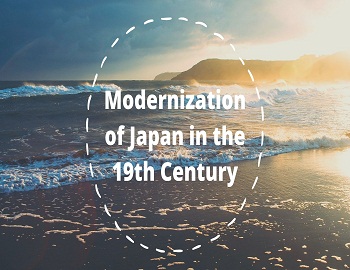Modernization of Japan in the 19th Century:
When the Asian countries were writhing under the clutches of Western imperialistic exploitation, a small island-country Japan not only succeeded in keeping off imperialist powers at bay but also laid the foundation of the rise of a powerful nation. The Meiji reinstitution (1868) uprooted feudalism in Japan and through social, economic and political changes ushered her into the modern age.
In the early years of the 19th century, the Japanese feudal class ‘Shogun’ had a great influence on the monarchy. Visiting a foreign country and meeting foreigners were punitive offences. After the Japanese campaigns of the Commodore Party (1852 and 1883), the closed doors of Japan began to open. During the next three years Britain, Russia and Holland signed goodwill and friendship treaties with Japan to secure their interests. Emperor Mutsuhito put an end to the shogun system through Meiji reinstitution and presented Japan as a strong and prosperous nation before the world. With the reforms introduced in the fields of agriculture, economy, military and education etc. Japan rose as a world power. The reforms introduced during the Meiji period made Japan like a tiger awakened from its secluded slumber desperate to exhibit its might. The Chinese War gave him this opportunity. In this war, he defeated the largest army of Asia and justified his claim to be a world power. Europe grew apprehensive at this miracle of Japan and called it ‘yellow terror’. In 1902 England to the surprise of all signed a treaty with Japan on equal terms. This confirmed the Japanese prestige as a world power. To put a check on Russian expansionism, England strengthened the hands of the Japanese dwarf. Russian defeat in the Russo-Japanese war of 1904-05 shattered the invincibility of Europe. After this Japan became the chief shareholder in the plunder of China. The consequences of the Russo-Japanese War as well as the growing pressure of European powers on China brought about the Chinese revolution of 1911. Now the sleeping Asian tiger had fully awakened and its roar made not only Asia but the whole world look at it with wide-open eyes.









Comments (No)